FOCUS
Equity through mutual accountability
Collective capacity building helps educators address the needs of all students
By Joaquin Noguera and Pedro Noguera
October 2018
Vol. 39 No. 5
Read the remaining content with membership access. Join or log in below to continue.
Sed ut perspiciatis unde omnis iste natus error sit voluptatem accusantium doloremque laudantium, totam rem aperiam, eaque ipsa quae ab illo inventore veritatis et quasi architecto beatae vitae dicta sunt explicabo. Nemo enim ipsam voluptatem quia voluptas sit aspernatur aut odit aut fugit, sed quia consequuntur magni dolores eos qui ratione voluptatem sequi nesciunt. Neque porro quisquam est, qui dolorem ipsum quia dolor sit amet, consectetur, adipisci velit, sed quia non numquam eius modi tempora incidunt ut labore et dolore magnam aliquam quaerat voluptatem.
References
Blankstein, A. & Noguera, P. (2015). Excellence through equity. Alexandria, VA: ASCD.
Ladd, H.F. (2012). Education and poverty: Confronting the evidence. Journal of Policy Analysis and Management, 31(2), 203-227.
Lewis, A. & Diamond, J. (2017). Despite the best intentions. New York, NY: Oxford University Press.
Noguera, P. & Wing, J. (2006). Unfinished business: Closing the achievement gap in our nation’s schools. San Francisco, CA: Jossey-Bass.
Orfield, G., Ee, I., Frankenberg, E., & Siegel-Hawley, G. (2016). Brown at 62: School segregation by race, poverty, and state. Los Angeles, CA: Civil Rights Project, University of California-Los Angeles.
Quinn, J. & Fullan, M. (2015). Coherence: The right drivers in action for schools, districts, and systems. Thousand Oaks, CA: Corwin.
Rich, M. (2015, January 16). Percentage of poor students in public schools rises. The New York Times. Available at www.nytimes.com/2015/01/17/us/school-poverty-study-southern-education-foundation.html.
Rothstein, R. (2017). The color of law. New York, NY: Liveright Publishing.
U.S. Commission on Civil Rights. (2018). Public education funding inequity in an era of increasing concentration of poverty and resegregation. Washington, DC: Author.
Recent Issues
NAVIGATING NEW ROLES
April 2025
Whether you’re new to your role or supporting others who are new,...
LEARNING DESIGNS
February 2025
How we learn influences what we learn. This issue shares essential...
BUILDING BRIDGES
December 2024
Students benefit when educators bridge the continuum of professional...
CURRICULUM-BASED PROFESSIONAL LEARNING
October 2024
High-quality curriculum requires skilled educators to put it into...











